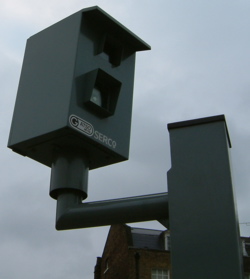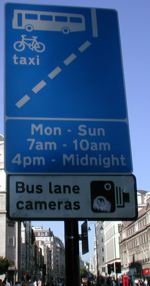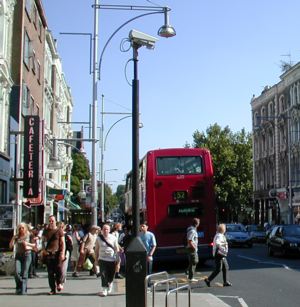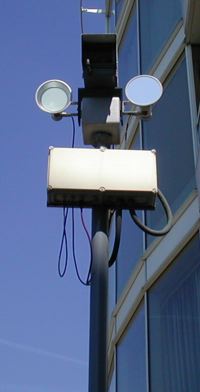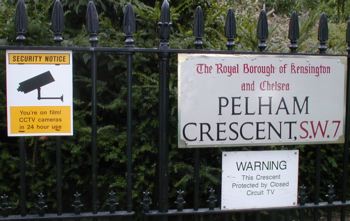Steven Chapman is the sort of blogger whom White Rose readers ought to keep on their list of haunts. He has White-Rose-relevant material here about how war erodes civil liberties, even in the face of the strongest written constitutions, and here about car surveillance via road pricing, with a link to this Observer story.
|
|||||
|
David Farrer comments here on the case of a someone who may be sent to jail for using a mobile telephone to record and transmit proceedings in the Perth Sheriff Court. Apparently they don’t like it so much when we use technology to keep tabs on them. From the Telegraph yesterday:
This last is to counter the fear among the teachers that the cameras will also be used to spy on them.
Not for the first time, my reaction to being told the cost of some surveillance kit is: that’s cheap. Soon, if they want it to be everywhere, and they do, it will be. Supermarkets have begun trials on coordinating RFID tags and security cameras in order to reduce theft as the first step in converging logistical and surveillance technologies. The first step has already been taken through trials at a supermarket in Cambridge, where RFID tags were used to identify a purchaser through a security camera. In this particular case, a second camera at the checkout was used to ensure that the item was purchased legally. The technology is also utilised on the London Tube.
The article produced a link to one of the lesser known groups within civil liberties and demonstrates the diversity of organisation that these concerns attracts. The campaign, known as Consumers Against Supermarket Privacy and Invasion and Numbering, or CASPIAN, is opposed to loyalty cards as those who opt out of obtaining a card tend to pay higher prices as the cost of preserving their privacy. They also provide the answer for that burning question…With all the pain and suffering in the world and people starving in [fill in location here], how can you justify spending your time on supermarket club cards? The answer includes: My passion happens to be preserving personal freedom, staving off totalitarianism, and resisting Orwellian intrusions. Sentiments we can all agree with. Over wide areas of the urban first world, the Panopticon State is already very much a reality. Folks like us, the contributors to White Rose, Samizdata.net and the grizzled veterans over at Privacy International cry out warning pretty much daily alerting people not so much about the simple fact of surveillance per se but rather surveillance plus data-pooling. Yet it is important to draw people attention to the basic facts and encourage them to notice the evidence right in front of their eyes, peering down at them like menacing mechanical crows perched on metal branches jutting from walls everywhere, that we are increasing under surveillance by the state directly… 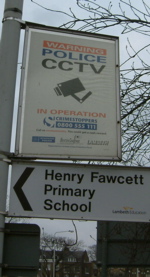
…and by companies whose surveillance footage states are increasingly reserving themselves the right to gain access to on demand… 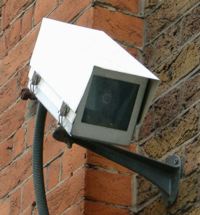
But the people who would like our every move recorded and subject to analysis are not fools. They would rather you did not actually notice what is before your very eyes and so we are seeing the second age of CCTV: more aesthetically pleasing and less intrusive cameras, rather than the stark utilitarian carrion crows which currently predominate… 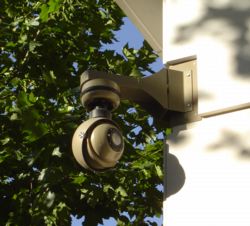 …rounder, blending in with the background… 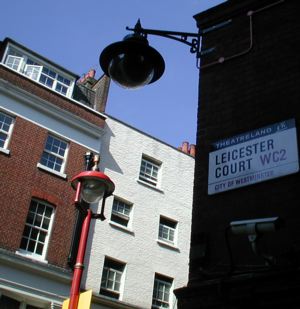 …looking more like the lighting fixtures than the all-seeing-eye. The second age of security cameras is at hand…still quite literally staring you in the face, but increasingly hiding in plain sight, counting on a mixture of clever design and the fact that familiarity breeds contempt. But Big Brother is still watching, only with a little more style and taste now. That just makes it more dangerous. 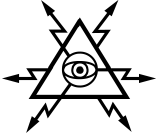 This from Harry Mount in the Telegraph today, on speed cameras:
It’s worth reading more of it of course, but that struck me as the killer para.
And so on. I’m a libertarian and I don’t quite know what I think about all that. I mean, I’m in favour of trades of all kinds, including lots of trades that other people aren’t in favour of. I think, for example, that it ought to be legal to buy a small and sneaky camera, if you want to buy one and if someone wants to sell you one. It’s a bit like guns. It’s what you do, and in this particular case it’s also where you do it, that matters, not the mere owning or buying of the thing itself. But my attitude to posting on White Rose is: if it’s of interest and relevance, stick it up. I’m trying to give the customers here, that is to say the people the editors here want to be the customers here, what they want. No doubt they’ll straighten me out if I’m doing it wrong. Since September 11, 2001, travellers to the United States have readily accepted that a few more checks and questions are the price they have to pay for safety. But is security turning into surveillance? Michael Kerr reports.
Often, we expect curbs on civil liberties to be the desired goal of our own left-wing authoritarians or the unfortunate consequence of some EU directive. It is rare that the demands of the United States may result in one more step towards the “surveillance state”. EU passports will soon have to incorporate a radio frequency identification (RFID) chip, including biometric data, that would be machine-readable for entering the US. This is a consequence of the US Enhanced Border Security and Visa Reform Act of 2002 that demands all visa-free entrants incorporate biometric information on their passports from October 2004. (Hint: you may want to change your passport if you wish to visit the United States after this date). In the tension between liberty and security, the demands of this Act appear a prudent measure to curb the use of false passports for perpetrating acts of terrorism. However, the biometric identifiers used will be standardised according to workgroups meeting for the International Civil Aviation Organisation and International Organization for Standardisation. Their work will be co-opted by the European Union. A European biometric identification strategy was announced in June at the summit in Greece. The European Biometric Forum was established, with major players and strong links to their counterparts in the United States, to ensure that there would a single standard for applications of this technology, pursued by all member states of the EU. The EBF will be launched on the 21st July in Dublin and the technology is being promoted as an additional protection for the privacy of individuals, although the growth is driven by state institutions and telecom/security companies. The BBC reports that in a surprisingly positive move, the US Senate has voted to withdraw funding from the proposed Terrorism Information Awareness programme (TIA). The TIA (previously called by the much more chilling name “Total Information Awareness”) was to have been the largest snooping system in the world. Its objective was to centrally co-ordinate and cross-reference every single piece of data available on every single person in America. The justification for this appalling idea was the phoney “war on terror”. As usual, supporters used the lie that “the innocent have nothing to fear”. It now seems that with funding removed the TIA will be scrapped – publicly at least. Now if only this country could remove funding from then scrap Big Blunkett. When you type “Surveillance” into google, some of the more interesting stuff is the adverts on the right. The top one in the list today was this. The one with the creepiest name was this. A commenter (“Grace”) on a previous surveillance related post of mine here said that governments will always be more powerful users of this stuff than the general run of surveillance-inclined people:
And then she recommends a book. But she’s missing my point. I’m not saying that all these regular punters are going to try to spy only on the government and thereby to hold it at bay, although no doubt that will be part of the story, in the form of spying on lesser government officials and the like. My point is that people concerned about surveillance don’t just have the government to worry about. They’ll also have the amateurs spying and spooking all over them. These amateurs may not have mainframe computers and super-intelligent software, but they are awfully numerous, compared to the government. And the kit that the amateurs need is now getting very cheap, and very easy to use, and to hide. As these adverts prove. I second Brian’s post on the same topic. The Evening Standard reports that one in 30 Britons now has their DNA stored on a national database of genetic fingerprints. The database reached the two million mark today, and is one of the world’s largest. It is used to help solve an average of 15 murders and 31 rapes each month. The government is trying to make it easier to add DNA entries to the database. A law before Parliament would allow samples to be stored from people when they are arrested and retained regardless of whether they are convicted or not… Have a brush with the law and you are on file for life. Currently a sample can be stored only if a person is charged. The move is expected to dramatically increase the number of samples stored but has led to claims from civil liberties groups and the Liberal Democrats that the system is being abused by the government. Home Office Minister Hazel Blears said that only criminals should be worried by the scale of the database.
Yes, we do. 
The State is not your friend |
|||||

All content on this website (including text, photographs, audio files, and any other original works), unless otherwise noted, is licensed under a Creative Commons License. |
|||||
